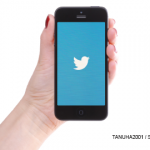One of the club’s key organizers, Chris Collins, MD, associate professor of medicine at Georgetown University Medical School, says Twitter is particularly fit for physicians because of its increasing acceptance as a tool in medical education and ease of use.
“It’s open access, and it’s easy to make new connections,” he says. “It’s great; it’s all about optimizing interactions without barriers to geography or anything else.”
Get Engaged
He has also participated in several other healthcare-related live tweet chats, answering general questions about patient care—but without trying to give individualized medical advice.
“Any time you get patients engaged in a conversation about their disease, you help develop a more well-informed patient,” he says. “I see Twitter as one potential way of getting patients to take a greater role in their own healthcare.”
Ronan Kavanagh, a highly regarded rheumatologist in Ireland and a known Twitter enthusiast, says he is on Twitter about eight to 10 times a day. He says it exposes him to networks of people essential to modern medical care—such as medical humanities and medical technology—that he couldn’t get from traditional sources.
“It also allows me to learn every day—rather than saving up my learning for big meetings,” he says.
Just recently, he says, he saw a paper posted on Twitter about the use of high-dose fish oils as an add-on to triple therapy in early RA—and he’ll be trying out that approach.
At Beth Israel, Dr. Hausmann gave Rheumatology Grand Rounds about using social media to make you a better rheumatologist. He has given the talk elsewhere as well, and he says, “I don’t think I was able to convince anybody about the usefulness of Twitter, which is kind of sad.”
Cautions
There are certainly reasons to be cautious when using Twitter, users agree. Many physician Twitter users have a special account devoted only to professional use and only post material they would be comfortable having patients and colleagues see. They don’t post personal information under those usernames.
The American Medical Association has published guidelines on professionalism in social media. Suggestions include:
- Respect patient privacy;
- Maintain appropriate boundaries when interacting with patients on social media;
- Report unprofessional content that’s been posted; and
- Recognize that online actions can negatively affect reputations.
Those who use Twitter say those rules are appropriate, but say doctors shouldn’t overreact and be blind to the benefits. He says his hospital gave a talk about social media when he first started working there, and it was all about how to avoid getting into trouble.



